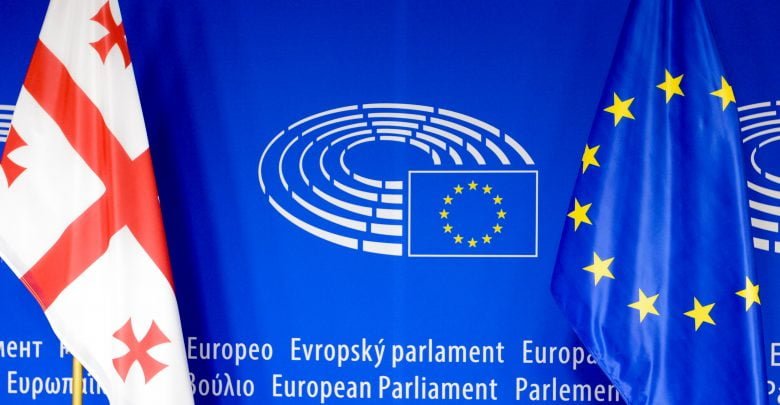
Georgian Politicians on AA Implementation Report
On September 16, the European Parliament (EP) adopted the report on the implementation of the EU Association Agreement (AA) with Georgia, that along with positively assessing Georgia’s progress in the adoption of reforms and legislations, highlights some shortcomings, in particular, in the judiciary system. The document which underscores MEPs’ high expectations for October 31 parliamentary elections in Georgia, triggered varying reactions among the ruling Georgian Dream (GD) and the opposition parties.
Chairperson of the Parliament, Archil Talakvadze, held a briefing, affirming that the report “positively evaluated” Georgia’s implementation of the AA, including reforms and legislative amendments. Parliament Speaker reassured “European partners” that “the parliamentary elections will be held in a free, fair and transparent environment.”
“We value Europe’s trust in Georgia and will continue to cooperate as much as possible to protect the benefits that our citizens have received, namely, visa-free travel, as well as the free trade regime with the European Union,” Talakvadze highlighted.
Speaking of EU’s reiterated support to the sovereignty and territorial integrity of Georgia, Parliament Speaker asserted that “the issue of [Russian] aggression against our country and the occupation of territories remain very high on the international agenda,” noting that the EP report gave due attention to the humanitarian problems, including the issue of IDPs’ return to occupied Abkhazia and Tskhinvali regions.
Responding to the EP’s urge to the Georgian government to “refrain from interfering in media freedom or pursuing politically motivated judicial cases against media owners”, Georgian Dream MP, ex-Speaker Irakli Kobakhidze stated that “politically motivated cases do not exist” in the country. Kobakhidze asserted that in Georgia, there are only “political criminals who have been given specific sentences.” Assessing criticisms cited in the report as “soft,” MP Kobakhidze maintained that “the majority of MEPs disagreed with the point”, but were forced to find a “compromise” with a minority of critical lawmakers.
On their part, the opposition also reacted to the EP’s adoption of the AA implementation report. United National Movement (UNM) MP Salome Samadashvili said the report sheds light on “the problems related to the fact that we do not have an independent judiciary in the country, that there are too many questions about the democratic process in the country.”
Touching upon the upcoming Parliamentary Elections, Samadashvili asserted that the elections “will be a test for Georgian democracy and therefore, our (Georgia’s) European future will largely depend on what happens in the upcoming elections.”
“If we take into account the messages voiced by MEPs when they say that oligarchic rule threatens democracy in the country, I think it is clear that the main obstacle to our country’s European future is Bidzina Ivanishvili’s oligarchic regime,” the UNM MP concluded.
“I have never in my practice encountered such a clear assessment and warning against the Georgian Dream government,” European Georgia MP Giorgi Kandelaki claimed. For the European Georgia lawmaker, the report illustrates that Georgia’s “partners and the European Parliament are prepared to see changes in Georgia.”
MP Eka Beselia, chair of the For Justice party, affirmed that “this report, as well as others, in many instances, contain criticism towards judiciary reform due to the government’s incorrect decisions that are harmful to democracy.” The For Justice party chair encouraged the ruling Georgian Dream party to not take the issue of politically motivated judicial cases and the upcoming elections lightly, emphasizing that international observers are looking at the election process “with a magnifying glass at the moment.”
This post is also available in: ქართული Русский